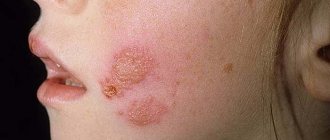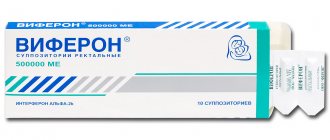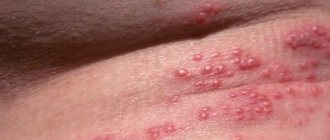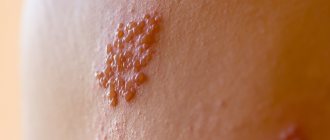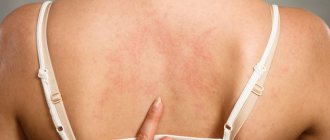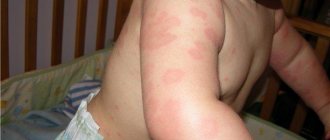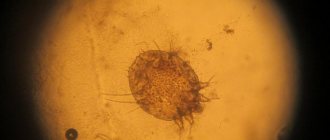Herpetic infection is characterized by localization of the rash on the lips, mouth or anogenital area.
But some people get herpes on their body.
This clinical form of the disease is called herpes gladiatorum.
Athletes involved in contact sports (for example, wrestlers) are most often infected.
This is due to the fact that transmission of the disease occurs through direct contact of skin areas of a sick person and a healthy person.
In an infected person, blisters appear exactly in the place where the virus penetrated the skin.
Causes of herpes on the body
The disease is caused by herpes simplex virus type 1 or 2.
They have almost identical clinical manifestations.
In addition, the treatment prescribed is also the same.
Infection occurs through contact.
At the same time, the carrier of the infection is less contagious.
During periods of remission, it is not contagious at all.
You can become infected only during an exacerbation of the disease, when there is a rash on the person’s body.
Only in this case the virus is released into the external environment and can enter the skin through close contact.
On the other hand, it requires the susceptibility of the person who contracts the disease.
To do this, the skin must be damaged or macerated.
The state of immunity is of no small importance.
The weaker it is, the higher the risk of infection, and the more severe the herpes infection will be.
Complications of the disease
In most cases, the active form of herpes virus infection can be successfully treated with complex therapy. But if the patient’s immunity was severely suppressed, the following consequences are possible:
- Pneumonia.
- Encephalitis.
- Meningitis.
- Inflammation of a number of internal organs - kidneys, digestive tract.
- Herpetic arthritis.
- Damage to both the urinary and reproductive systems.
- Disruption of blood vessels and heart muscle.
- Conjunctivitis.
One of the most common complications is neuralgia. This is severe itching and excruciating pain in areas of the body affected by the virus. Antiviral drugs are not able to eliminate this problem. The patient is additionally prescribed painkillers, antidepressants, vitamin complexes, and physiotherapy.
Symptoms and signs of herpes on the body
The main symptom of the disease remains a rash.
It appears on the head, neck, shoulders or torso.
In the vast majority of cases, morphological elements are represented by vesicles.
After infection, there is an incubation period that lasts 1-2 weeks.
Then comes the prodromal period.
At this time, a person may feel a slight burning or tingling sensation in those areas of the body where rashes will soon appear.
After 1-2 days the rash actually appears.
Initially, these are small papules that quickly turn into vesicles.
They are located on a hyperemic background.
Each bubble is surrounded by a bright red rim.
There is a clear liquid inside.
Initially the bubble is tense.
But then he becomes lethargic.
The contents often become cloudy.
In the case of a secondary bacterial infection, vesicles may suppurate and pustules may form.
Infection occurs quite often, because against the background of herpes on the body, the immune system deteriorates.
In addition, a weak immune system is an initial predisposing factor for contracting a herpes infection and aggravates its course.
Once the rash forms, general symptoms may occur.
The person experiences weakness, fever, and muscle pain.
After a few days, the vesicles open, and in their place ulcers appear, which dry out to form crusts.
After a week they go away, and only temporary hyperpigmentation remains in this place.
Clinical course of herpes on the body in adults
In most cases, herpes is mild.
Symptoms occur only during primary infection.
The virus then remains in the body.
Relapses occur from time to time.
But they usually go unnoticed by the patient.
Herpes on the body recurs in 80% of patients within the first year.
But only one in three suffers from symptoms.
Others do not even notice this relapse or do not understand that it is herpes.
Because there are no rashes or they are very minor, they quickly regress and do not cause discomfort to the patient.
The period of viral shedding is short, but infection of contact persons is still possible.
Of those who experience significant symptoms during an exacerbation, half suffer relapses twice a year or more often.
Such patients require ongoing treatment with antiviral drugs.
They are also subject to examination to assess their immune status.
Because herpes recurs often and severely in people with reduced immune system function.
A feature of relapses, even clinically pronounced ones, is a milder clinical course than with primary infection.
Fewer herpetic rashes appear on the body.
The rash causes less discomfort and regresses faster.
There is usually a correlation between the severity of symptoms during primary herpes infection and subsequent relapses.
The more severe the disease at the very beginning, the more frequent and severe the exacerbations will be.
Risk factors
Herpes on the thigh may not appear for a long time. Risk factors can provoke its active, open stage:
- Severe physical fatigue.
- Chronic stress.
- A set of bad habits: addiction to alcohol, tobacco, drug addiction.
- Serious chronic diseases: diabetes, ARVI, HIV, AIDS, etc.
- Intoxication of the body.
- Prolonged exposure to ultraviolet rays.
- Painful menstruation.
- Violation of wakefulness and rest.
- Unstable, impaired activity of the immune system.
- Severe hypothermia/overheating.
- Wrong diet.
- Taking medications for autoimmune diseases.
- Frequent colds.
- Taking medications that somehow suppress the strength of the immune system.
Diagnosis of herpes on the body
Herpes on the body has characteristic symptoms.
Often the diagnosis is made clinically.
It can be confirmed using molecular biological tests.
PCR is usually used.
The method makes it possible not only to confirm the herpetic nature of the blisters on the body, but also to establish the type of virus and evaluate its concentration in tissues.
The doctor usually receives results from the laboratory the day after the skin scraping is taken.
Even before receiving them, antiviral treatment can be prescribed, which helps get rid of rashes much faster.
Features of the rash
Herpes on the thigh (photos are presented in the article) can manifest itself in three variations:
- The appearance of single, isolated rashes and spots. The mildest form of infection.
- Non-shingles herpes on the inner thigh (women, men and children). Bubbles and sores are located at some distance from each other.
- Shingles rash. The most complex and painful form of the disease.
Treatment of herpes on the body
There are means for etiotropic therapy of herpes infection.
Names of drugs:
- acyclovir
- valacyclovir
- famciclovir
They have the same mechanism of action: they block virus replication.
These drugs are comparable in effectiveness.
But they differ in bioavailability, doses used, and frequency of use.
The most studied drug is acyclovir.
It is available in different forms: gel, tablets, solutions for parenteral administration.
Ointments and injections for herpes on the body are rarely used.
Injections are usually only necessary if disseminated forms of herpes infection develop.
That is, when the pathology is severe, not only the skin is involved, but also the internal organs and the brain.
Similar situations occur against the background of HIV or other immunodeficiencies.
But they are relatively rare.
Most patients manage well with pills.
Gels can be used to treat rash areas.
But this is only an auxiliary tool.
The tablets can be used without ointment.
In this case, the use of ointment without tablets is undesirable, because the treatment result will be weaker.
Causative therapy is not mandatory.
If herpes on the body is mild and the symptoms do not bother the person, the rash will go away on its own.
But this will happen later, and the risk of secondary bacterial infection will be higher.
Situational treatment
For most patients, situational treatment regimens are used.
That is, therapy is carried out only when herpes worsens.
And also during the period of primary infection with this disease.
The earlier therapy is started, the better the results.
If several days have passed since the appearance of herpes on the body, and ulcers or crusts have appeared in place of the vesicles, there is no longer any point in using acyclovir.
It will not affect recovery topics.
It is optimal to start treatment during the period of prodromal phenomena.
Patients with recurrent herpes on the body can easily feel it.
The rash always appears in the same place.
Before they occur, there is a slight feeling of discomfort, a burning sensation in the problem area of the body, tingling or subjective symptoms.
During this period, you need to start taking acyclovir.
Then the symptoms that arise will be minimal.
A minimum of rash elements will appear on the body, which will quickly regress.
In addition, the duration of viral shedding will be reduced.
Therefore, the likelihood of infection of contact persons will decrease.
Treatment for primary infection lasts an average of 10 days.
For relapses - an average of 5 days.
But the timing of therapy is individual.
The medication should be continued until symptoms begin to subside.
Suppressive treatment
Some patients are forced to receive treatment with antiviral drugs continuously.
They usually take valacyclovir tablet once a day.
This drug is easy to use.
It is well absorbed from the gastrointestinal tract and maintains an effective concentration in the blood for a long time.
Indications for suppressive treatment are frequent or severe exacerbations of herpes on the body.
As long as a person takes the medications, relapses usually do not occur.
But if the medications are discontinued, they are possible.
This is because valacyclovir does not kill the virus.
It just prevents it from multiplying.
The infectious process does not activate, and a rash does not form on the body.
But even taking medications for years, you cannot completely cure herpes.
Preventative treatment
Sometimes the purpose of taking antiviral drugs is to prevent infection of contact persons.
For women, the goal of therapy may also be to prevent infection of the child during childbirth or in the neonatal period.
Prevention is often carried out in a family where one person has herpes and the other does not.
Considering the low-impact nature of the infection, such cases occur quite often.
But still, if you live together for a long time, sooner or later a person can become infected.
To prevent this from happening, you can use medicinal prophylaxis with antiviral drugs.
They should be taken by the person who suffers from herpes, and not by his partner who is afraid of infection.
During antiviral treatment, viral shedding stops.
The medications can be taken continuously (suppressive therapy).
Their irregular use is allowed, only before sexual intercourse.
If sexual activity is irregular, start taking acyclovir or another antiviral drug 3 days before the planned act.
Immediately after it, preventive treatment can be stopped.
We should also not forget that infection can also occur through close household contact when herpes is localized on the body.
Immune treatment
Antiviral drugs are not the only way to fight herpes.
There are at least 2 more effective methods to prevent frequent relapses and reduce their severity:
- introduction of the vaccine
- general immunocorrection
People with frequent relapses of herpes and its severe manifestations on the body differ from others in that their body is weakened and their immunity is reduced.
A weak immune system may have specific causes, such as HIV or diabetes.
In this case, the efforts of doctors should be aimed at eliminating these causes.
For HIV, adequate antiretroviral therapy is selected to reduce the viral load.
Diabetes mellitus requires a complete correction of carbohydrate metabolism.
Sometimes the immediate causes of decreased immunity cannot be identified.
But with the help of an immunogram, the doctor can determine which parts of the immune system are not functioning well enough.
After the tests, treatment is selected for the patient.
It improves the functional state of the immune system.
As a result, the human body is able to more effectively resist the herpes virus.
After such treatment, not only does the frequency and severity of relapses decrease, but the risk of complications and susceptibility to other infections decreases.
Specific immunotherapy can be carried out using a herpes vaccine.
It is administered during the period of remission.
The vaccine enhances the production of antibodies against the infectious agent.
Therefore, the disease recurs less often.
For many patients, exacerbations stop completely.
If they do occur, then herpetic rashes on the body appear in minimal quantities and quickly disappear.
Prevention
The only way to prevent infection with the herpes virus is to avoid contact with its carriers. Due to the fact that almost all people on the planet are infected with this virus, this preventive measure turns out to be ineffective.
The virus can remain in the human body for a long time and not manifest itself in any way. In order to prevent its activation, you should adhere to the following recommendations:
- maintain routine , devote enough time to rest and sleep;
- give up all bad habits;
- spend enough time outdoors ;
- eat properly and rationally
- exclude or minimize the intake of harmful foods (fried, smoked, sweet and spicy foods);
- observe basic rules of personal hygiene;
- treat all diseases in a timely manner
- if necessary, take vitamin complexes;
- exercise regularly or at least do exercises in the morning;
- avoid excessive physical activity;
- avoid stressful situations and learn to respond adequately to all problems;
- At the slightest manifestation of the disease, seek help from a specialist.
By constantly monitoring your health, devoting proper time to rest and sleep, patients can easily avoid relapses. It has been proven that the herpes virus enters the acute phase only when the immune system is suppressed and the body is unable to resist it.
Folk remedies for herpes on the body
Some patients try to treat herpes on the body using traditional methods.
Common methods:
1. Boil an egg, add vodka and leave in the refrigerator for three days.
Then eat the egg and drink the vodka.
Repeat for 3 days in a row.
If the herpes on the body has not disappeared within 10 days, you need to perform the procedure again.
Surely many men will like this recipe.
And it is truly effective in the vast majority of cases.
Usually herpes goes away within 10 days even without treatment.
And if it doesn’t go away, then after the next portion of vodka with egg, the rash will definitely disappear.
Sooner or later it will happen, no matter what you do.
2. Use tincture of calendula or birch buds in 70% alcohol.
In addition, the same infusion can be rubbed into the body in the area of herpetic rashes.
3. Salt and soda are placed on the vesicles and stored for 20 minutes.
4. Lubricating problem areas of the body with essential oils: bergamot and tea tree.
5. Applying halves of garlic cloves, aloe juice or honey to herpetic blisters.
There are hundreds of similar recipes on the Internet.
They actually supposedly help most people.
Because herpes gradually goes away even without treatment.
However, there is no reason to believe that using calendula, garlic or three days of drinking (vodka with eggs) will make the symptoms go away faster.
The risk of complications is not reduced.
The relapse rate does not decrease.
The likelihood of infecting a partner remains just as high.
When can you use folk remedies:
- you are on a desert island where there are no doctors or pharmacies yet
- Herpes is mild, and this is the first episode (not a relapse)
- you do not have a sexual partner who could be infected with this infection
But if herpes on the body recurs, you are afraid of infecting your partner, or the symptoms are severe and long-lasting, you will need really effective treatment.
Folk remedies have an exclusively psychotherapeutic effect.
They help to implement the principle “something needs to be done.”
Such treatment does not require significant time and material costs.
But there is really no benefit from traditional methods.
Science does not yet know herbs or foods that have antiherpetic activity.
Treatment regimen
Treatment of herpes on the thigh (you can see photos of the rash in the article) is necessary, since the disease causes a severe deterioration in the quality of life. Moreover, its advanced forms are fraught with the development of complications.
Usually the doctor prescribes the following therapy program:
- Taking tests, periodic visits to the attending physician.
- Taking and using prescribed antiviral medications - tablets, ointments, injection solutions.
- The use of immunomodulators (medicines that stimulate the body's defenses).
- Taking antihistamines.
- Maintaining bed rest, turning the patient to a balanced, healthy diet. Exclusion from the diet of foods that can have an irritating effect on the body - caffeine-containing drinks, sweets, baked goods, etc.
- Regular change of bath accessories, bed linen and underwear.
The dosage of medications and the duration of the treatment program are calculated by a medical specialist individually for each patient. In the most general case, therapy takes approximately one month.

